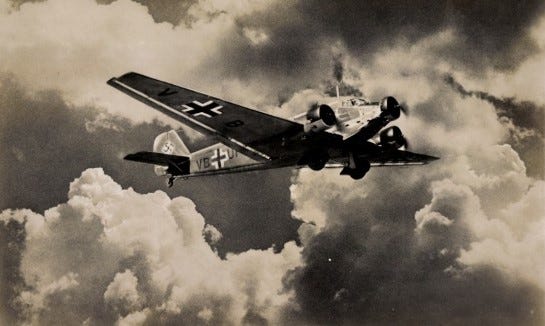
August 11 - August 18, 1942.
Summary:
Anton Wagner buys a Russian revolver while fulfilling his clinical rotation on the Russian front. The soldier who sells it to him tells him it is plunder.
Fritz Hartnagel receives another distant letter from Sophie Scholl. She tells him little about her circumstances or how she’s doing, but does let him know she has started sketching again. He notes that her previous “soft lines” are now “lively and very strong strokes,” and does not know what to make of this in terms of change in Sophie’s personality.
Fritz believes ever more firmly that he must listen to internal orders, i.e., conscience, and steadfastly refuses to hand his men over to military courts for punishment. He advises his company that the only rule they must observe, no matter what: They may not desert their post when on guard duty. When two men do exactly that, he is grieved that he must hand them over to the proper authorities.
He describes for Sophie his inner turmoil over the need to maintain his “authority” and his sense that enforcing military laws can unnecessarily ruin lives. It’s a harsh dilemma.
Fritz’s Signal Corps unit is tasked with adjusting communications connections and reorganizing Signal Corps activity as German troops push ever closer to Stalingrad. They are, for the moment, west of Kalach in the great bend of the Don River.
He notes that Hans Scholl will see lots of wounded, that German casulaties are high.

Sophie’s wish that Fritz undertake a campaign to get better food for Dr. Muth sits wrong with Fritz. He begrudgingly says he will ask his mother if she can spare any rations, but points out that his mother does not know Dr. Muth at all. And he will NOT write a letter to Carl Muth to encourage him, because it would be presumptuous.
A routine task near the front lines could have easily resulted in Fritz’s death. He tells Sophie that their navigator had gotten confused and they had ended up on the other side of the front lines. They are not shot down only because Russians on the ground were surrendering to German troops. But the dangerous detour had caused them to spend the night in the desert, without weapons, blankets, or fire.
Fritz’s August 18, 1942 letter shows the depth of his inner turmoil, as he grapples with Germans shooting POWs, a clear violation of the Geneva Convention, and needlessly destroying Russian food sources like cattle and vegetable gardens. The German army is taking everything they can, leaving nothing for civilians, destroying what remains.
Fritz Hartnagel cannot bear the injustice he is forced to witness.
Why this matters:
This segment is public, so everyone who is interested may listen to Fritz’s strong words. His passion for justice is strong and defines who he was becoming. And his anger… it was so palpable in the letters from this period. It’s clear that what he witnesses has stirred up a righteous anger that burns inside him.
White Rose History, Volume II, pages 167-170.
Notes and references
From this time forward, Fritz Hartnagel’s inner rage at the injustice he is forced to bear witness to and participate in? Is unmistakable. His reports had to have fueled White Rose friends’ urgency regarding resistance.
I don’t take exception to Thomas Hartnagel’s orthography as Samiller, because there is indeed friendly dispute among genuine White Rose scholars regarding his name. Sometimes it’s written Samiller, other times, Samüller, and also Sammüller. Even with the Protokolle (Gestapo interrogation transcripts), the same Gestapo agents will write it differently. I went with Traute Lafrenz’s orthography of her friend’s name, Raimund Samüller.
No, my complaint is the “first name unknown” part, as if Raimund Samüller’s role in White Rose resistance wasn’t worthy of a tiny bit of extra digging.
Hartnagel, Thomas (Ed.). Sophie Scholl, Fritz Hartnagel: “Damit wir uns nicht verlieren”: Briefwechsel 1937-1943. Frankfurt am Main: S. Fischer Verlag, 2005.
Gestapo Interrogation Transcripts: Alexander Schmorell. RGWA I361K-I-8808. 3/11/1943 interrogation of Anton Wagner.
Errata to auto-generated transcript:
The daytime heat was so extreme, he told Sophie, that he had to bind his candle to a stick. If he did not, it would melt and “hold its head over the edge of the table, unable to bring itself to stand upright.” The day before, Fritz had to deal with something much worse than unbearable heat. — Italicized words omitted in transcript.
This young soldier told Fritz about Bishop Galen’s sermons and agreed to procure copies of them for Fritz to read. Fritz wrote, “I really was lucky when I chose him to be my driver and constant companion. Otherwise, I probably would not have noticed him among the crowd of 250 men.” — Italicized words omitted in transcript.
Podcast © 2024 Denise Elaine Heap. White Rose History, Volume II, Chapter 13, 2007 update, © 2007 Denise Elaine Heap and Exclamation! Publishers. Please contact us for permission to quote.
This podcast is a project of WHY THIS MATTERS, a newsletter of Center for White Rose Studies, that explores the reasons that voices silenced more than eighty years ago still speak to us today.
To order digital version of White Rose History, Volume II, click here. Digital version of White Rose History, Volume I is available here.
Why This Matters is a reader-supported publication. To support our work, consider becoming a paid subscriber. - All subscription funds are deposited directly to the account of Center for White Rose Studies, a 501(c )(3) nonprofit. Ask your tax accountant if your subscription is tax deductible.













Share this post